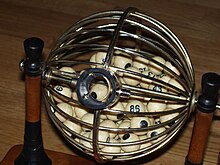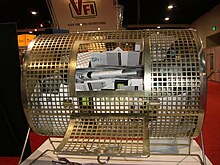tambiolo
Jump to navigation
Jump to search
English[edit]


Alternative forms[edit]
Etymology[edit]
From Tagalog tambiyolo, from Philippine Spanish tambiólo, from Spanish tómbola, from Italian tombola.
Noun[edit]
tambiolo (plural tambiolos)
- (Philippines, gambling) A fish bowl or barrel-shaped container where balls used in a raffle or a lottery are placed. In the case of a raffle, tickets may also be used. Can be made out of wire, glass, clear plastic, etc. Often has a handle, which, when rotated, mixes up the balls or tickets.
- Synonyms: raffle drum, bingo drum, lottery drum
- Coordinate term: roulette wheel
- 2010 November 30, Perseus Echeminada, “Rizal a lottery winner in 1892”, in The Philippine Star[1], retrieved 2020-06-25:
- The lottery during the time of José Rizal used the traditional manually operated tambiolo where numbers were drawn for the winning combinations.
- 2013 February 19, Neal H. Cruz, “Is bingo an illegal numbers game or not?”, in Philippine Daily Inquirer[2], retrieved 2020-06-25:
- A few days ago, the Manila police raided one such bingo game in the Blumentritt area. The police grabbed pieces of evidence, such as the tambiolo from which the winning numbers are taken, and cards, in the process of which there was a scuffle and the uniform of a policeman and the T-shirt of a Sangguniang Kabataan chair were torn.
- (Philippines, chiefly political) A system by which the government gives out assets, such as land, supposedly at random, but which some feel is actually rigged.
- 2016 July 5, Sandy Araneta, “‘Tambiolo land reform’ slammed”, in The Manila Standard[3], retrieved 2020-06-25:
- The “tambiolo land reform” in the Cojuangco- and Aquino-owned Hacienda Luisita sugar estate is a fraud and the fact that the lawyer of the estate is defending the process is sufficient proof that former Agrarian Reform secretary Virgilio Delos Reyes was conniving with the landowners.
- 2016, Arnisson Andre Ortega, “The Business of Building a Nation”, in Neoliberalizing Spaces in the Philippines: Suburbanization, Transnational Migration, and Dispossession, Lexington Books (Rowman & Littlefield), →ISBN, page 61:
- Through a dubious “tambiolo” method, 5,718 Certificates of Land Ownership (CLOA) were distributed to farmers.